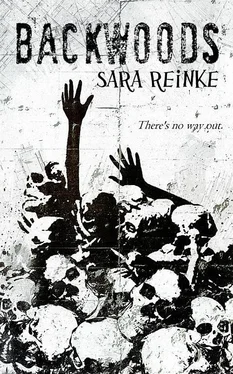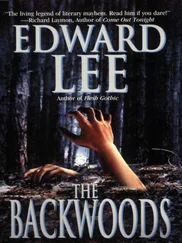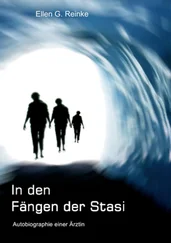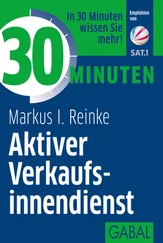“Not too super,” Andrew remarked. “O’Malley was blind. Those tumors on his face, they’d grown over his eyes. That one in the hallway, its head was being covered up, too.”
“A human’s immune system can fight off a viral infection, but only if it can interrupt the virus’s reproductive cycle,” Moore said. “If allowed to replicate itself, a virus can overtake its host. That’s what happened to the men in Alpha squad. They were given too much of the retrovirus too quickly. Instead of enhancing their physiology, it overwhelmed them.”
“It’s made them monsters,” Andrew said. “You made them that way.”
“Not me.” Moore glanced at him, seeming surprised by the accusation, if not somewhat stiffly offended. “It was Prendick’s call to administer the higher doses. I tried to warn him of the side effects, the risks involved, but he was impatient. He didn’t want a gradual transformation. The United States government is a results-oriented organization, that’s what he told me. And he wanted to give them results. He wouldn’t listen to reason, not from me or Lieutenant Carter, not from anyone.”
“Carter?” Andrew said. Dani had told him the lieutenant had been sent home shortly after Alpha squadron, suffering from Rocky Mountain spotted fever. Except Alpha squad didn’t really have Rocky Mountain spotted fever, he thought. “Did he become one, too?” he asked. “One of the screamers?”
At first, because Moore remained silent, Andrew thought he wouldn’t respond, but at length, he sighed heavily. “He threatened to go above Prendick’s head, to report Prendick trying to speed up the testing timeframe. Prendick turned the Alpha squad loose on him in the woods. Have you ever seen a wolf pack cull their prey? They separate the weak or sickly deer from its herd. Then they keep upwind of it, tracking it by its scent, before splitting up and chasing it until they exhaust it. When it’s beyond the point of resistance, they attack together, a collaborative effort.”
The corpse in the woods, Andrew realized, because at the time, he’d seen a rank insignia affixed to the tattered remnants of its uniform. A silver bar, a First Lieutenant’s insignia.
“They killed him,” he said and Moore nodded grimly. “The screamers, Alpha squadron. They chased him into a snare trap, then once he was hanging there, helpless, they killed him.”
And the same thing would’ve happened to me, he thought with a shiver. If my rifle hadn’t fallen, if it hadn’t discharged when it hit the ground and scared them off, they would have killed me, too.
“That’s what animals do,” Moore said. “That’s what they are now, what the retrovirus has done to them. It’s made the most primitive, predatory areas of their brain grow in size and dominance. It’s made them animals.”
“And we’re the prey,” Andrew whispered, aghast.
Again, Moore nodded. “Exactly.” Abandoning the books scattered on the floor, he approached his daughter, hooking his hand beneath her arm to pull her onto her feet. “We need to keep moving.”
As much as Andrew wanted to get the hell out there and find Dani, he found himself bristling. “Give her a minute, will you?” he said, planting his palm on Moore’s shoulder, jarring his grip on Alice loose. “Lucy was her friend. She’s grieving.”
“Lucy was a Siamang,” Moore replied drolly, shrugging away from Andrew’s hand. “And she’s not grieving. She doesn’t know how.”
“Bullshit. She knows how to cry. Not an hour ago, both of you stood in the hallway at the barracks, acting like it was some kind of miracle.”
“It was,” Moore said simply.
He reached for Alice and again, Andrew caught his arm, stopping him. “You know that thing wasn’t just a monkey to her. You taught Lucy to play Candyland. I doubt it was so you could sit around and play with her. Yeah, it might’ve all just been part of your experiment, but still.”
His voice abruptly faltered. Wait a minute, he thought, remembering the soft spot in Lucy’s skull. Her brain grew too big for her head. That’s what Alice had told him. It’s part of his experiment.
He’d felt similar soft places along Alice’s own scalp.
The medicine makes new nerves grow, Alice had told him . It fills in the missing places in my brain. It makes the electrical signals get to the right places.
“It’s the same,” he whispered in horrified realization. “You gave that shit to Alice?” He gave Moore enough of a shove to send him stumbling back a step. “The same virus you put inside Lucy? Inside O’Malley? Are you out of your mind? She’ll turn into one of those…those things!”
Moore reclaimed his footing, then bared his fists, squaring off against the younger man. “In small enough doses, your body can regulate the virus on its own. I used Lucy to calculate those proper doses to correct the neurological defects that caused Alice’s autism. Look at how much progress I’ve made.”
“Progress?” Andrew nearly spat the word. “You’ve been carving holes into her skull!”
“She was crying,” Moore snapped back. “You saw her—crying and laughing. Crying over you, and laughing because it’s the first time in her entire life that she’s shed tears at the right place and time. Do you have any idea what it’s like to be autistic? To have an autistic child?” He managed a bark of laughter. “No, you don’t. And spare me your bullshit, half-assed sympathies about how you can only imagine how hard it must be, because you can’t, Mister Braddock. You have no earthly idea.”
He shoved his forefinger out, pointing to Alice. “Look at her. She’s not grieving. She’s disassociated. Whenever she’s challenged too hard to think or feel or reason, this is what she does—she tunes out, turns off, disappears somewhere inside of herself so deeply, there’s no way to reach her. Nothing you can say, nothing you can do, not until she wants to, not until she chooses to emerge from this self-imposed psychological exile.
“By the time she turned three years old, she’d stopped smiling. She’d stopped laughing. She didn’t cry, she wouldn’t look at you when you called her name. It was as if something somewhere inside of her had come unplugged, some vital electrical circuit that made all of the other circuits in her brain work properly. And without it, she became a hollowed out shell, a life-sized, living, breathing doll.”
His brows furrowed and the corners of his mouth wrenched down in a frown. “Autistic catatonia, that was her diagnosis. She was so developmentally disabled and neurologically impaired, the doctors told us the most she could ever hope for was a lifelong regimen of medications. Do you know what it was like to hear that, Mister Braddock? To hear that your child is going to be afflicted with the mental capacities of a nine-month old infant for the rest of her life? To know that although you may have won a Nobel Prize for unraveling the secrets of the human body’s immunological processes, you couldn’t offer the same insight or capability to benefit your own flesh and blood?”
His voice had grown ragged and strained, his eyes glossy in the dim light. “Do you have any idea what that’s like to know your daughter will never look at you and be able to say I love you, not just because she can’t find the words, but because she can’t feel it? It’s hell. An unending, relentless life sentence in hell. It drove a wedge between me and my wife from which we never recovered. She left me. And when she did, she took Alice with her. Less than a year later, she had Alice institutionalized.”
Читать дальше












